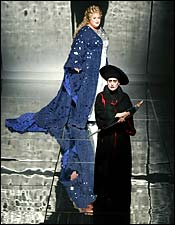
Not many opera productions can legitimately be called one-man shows, but every important element of the Metropolitan’s Die Frau Ohne Schatten—sets, costumes, lighting, stage direction—is the work of Herbert Wernicke, who died tragically last year at age 56, just four months after shepherding his dazzling vision of Richard Strauss’s complex operatic fantasy to the Met stage. The production is back in repertory and still well worth attending, even though there are several alterations, not all of them for the better.
For one thing, the performance once again makes many of the traditional cuts. Christian Thielemann, who conducted in 2001–02, correctly insisted on presenting the opera complete, not only restoring balance and unity to Strauss’s musical conception but also helping to clarify some of the more confusing aspects of Hofmannsthal’s elaborate fairy-tale symbolism. The man currently on the podium, Philippe Auguin, apparently has no such clout with Met management. Nor, for that matter, is he able to match Thielemann in terms of lyrical eloquence or symphonic power, although his smaller-scale view effectively brings out the chamber-music delicacy of the more intimate scenes.
Still, Wernicke’s conception remains basically unchanged, and a stunning one it is. The glittering hall of mirrors, with its suggestive reflections and half-lights, brilliantly conjures up the spirit world of the Emperor and Empress and contrasts startlingly with the mortal environment of the dyer Barak, his shrewish wife, and their drab workshop-home. Better than any Frau director in my experience, Wernicke finds the human core of the characters and ingeniously blends that element with the fantastic—the stage is alive every moment with poetic details that both illuminate and clarify the drama. What a pity that this revival inexplicably removes one of its most inspired touches and moving symbols: our final sight of the Emperor’s wounded Falcon, exquisitely mimed by Erico Villanueva, now healed and in flight after the Empress receives her shadow.
Unfortunately, the Met’s current cast is only just passable. Even Deborah Voigt seems in less-than-optimal voice and projects little radiance as the Empress, while John Horton Murray’s stressed-out tenor fights a losing battle with the Emperor’s music. Both Wolfgang Brendel as Barak and Deborah Polaski as his wife are more interesting to watch than to hear as they gingerly manipulate recalcitrant voices. As the malevolent Nurse, a role more often than not assigned to over-the-hill mezzos, Julia Juon ironically makes the most ingratiating vocal sounds of the evening, but she can scarcely carry the opera. No, this Die Frau Ohne Schatten revival is definitely still the designer-director’s show.
Young singers about to leave the conservatory can never go wrong these days, or so it seems, by testing their newly won vocal skills with a Handel opera. And there are plenty to choose from now that the composer is back in fashion, even works that have never before been staged in this country. The Juilliard Opera Center presented one of these rarities recently: Oreste, first performed in London in 1734, one year before such masterpieces as Ariodante and Alcina, and not seen again anywhere for two and a half centuries. If Oreste lacks the special defining musical character of the composer’s best operas, that’s probably because it is one of Handel’s so-called “pasticcios,” works for the most part assembled from preexisting music adapted to fit a new context—a practice that may now strike us as slightly lazy if not downright unethical, but one that was perfectly acceptable right up to Rossini’s day.
But this “cobbled-together” music is actually never less than diverting, with dozens of wonderful musical gestures to drive a plot that centers on the latter part of the Orestes legend, how he traveled to Tauris and was reunited with his sister Iphigenia after the Trojan War. The title role has several stunning arias that establish Orestes as a heroic character with severe emotional problems while still giving ample vocal opportunities to a virtuoso soprano castrato—or, in this case, the unaltered male soprano Michael Maniaci, whose voice has all the body, definition, and easy agility to do this difficult music full justice. The rest of the cast was no less impressive under Daniel Beckwith’s crisp musical direction: Amy K. Shoremount (Ifigenia), Camille Zamora (Ermione), Christianne Rushton (Filotete), Weston Hurt (Toante), and Javier Abreu (Pilade). Lillian Groag’s straightforward stage direction and the lean lines of Raul Abrego’s set design, subtly rearranged to suggest a variety of classical venues, served the piece handsomely.
Leos Janácek, his heritage and legacy, was the subject of last summer’s Bard Music Festival, which recently traveled south to Alice Tully Hall and offered more of the same. Even one event-filled weekend was hardly time enough to do more than touch on the subject, although it was instructive to hear songs by both Janácek’s teacher (Pavel Krízkovsk´y) and his pupil (Pavel Haas), music separated by 80 years of stylistic upheaval yet still sharing melodic and harmonic twists that show a direct lineage. Perhaps even more fascinating was a pairing of the second string quartets by Bohuslav Martinu and Janácek, written in 1925 and 1928 respectively, two composers from Czech lands who had practically nothing in common.
The main event, however, was a concert performance of Janácek’s last opera, From the House of the Dead, with the American Symphony Orchestra conducted by Leon Botstein. Not so much an action-packed drama as a collection of confessional narratives by the wretched inhabitants of a Russian penal colony, the opera illustrates precisely what Janácek meant when he appended this motto to the score: “in every creature a spark of God.” It’s a searing 90 minutes that examines a raw slice of humanity, and Botstein, with a devoted cast clearly gripped by the piece, made every note count.